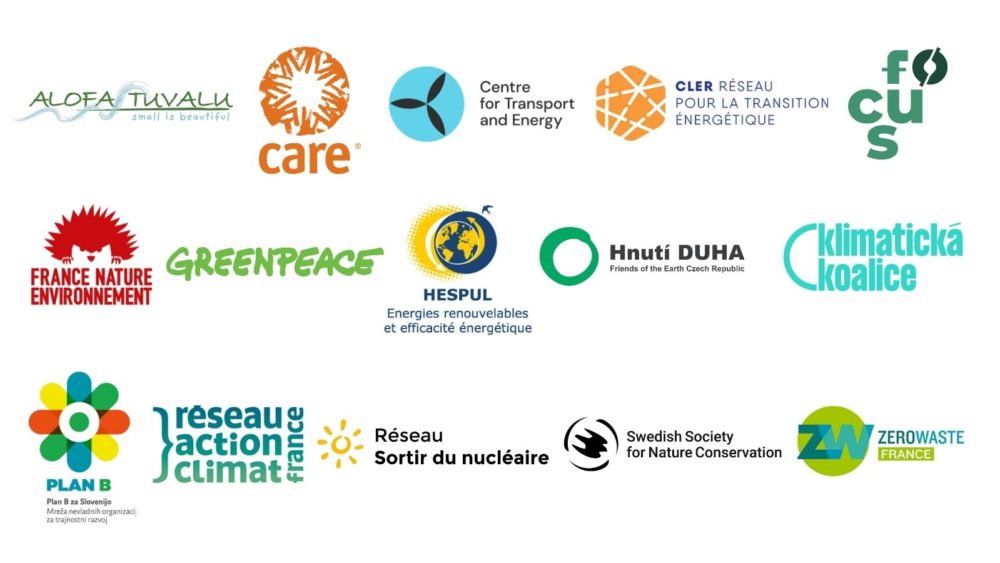– Joint NGO statement to FR-CZ-SE Trio EU presidencies-
Six years after the ratification of the Paris Agreement by the European Union, the world is still far from “on track” to reach the +1.5°C goal. According to all submitted Nationally Determined Contributions, temperatures would reach +2.7°C in the year 2100, far overshooting the already-critical +1.5°C limit. Despite an increased climate target to at least 55 % of GHG net emission reduction by 2030, the EU is still not matching the promises of the Paris Agreement.
Strong actions are thus needed to curb emissions much faster while making sure that the transition protects people from the costs and risks of runaway climate catastrophe and also reduce the dependence from fossil fuels that currently send energy prices soaring. This needs to be done in a socially fair and participatory manner that supports the most vulnerable.
The European Commission legislative package, Fit for 55, is a major opportunity to engage bold transformations in all sectors of the economy and to go well beyond the 55 % target and reach at least 65 % by 2030.
Finding the right compromise that will improve EU climate policy avoiding false solutions such as gas and nuclear is the paramount task of the new “trio” presidency of France, Czechia and Sweden which started this January. Over this one-and-a-half year timeframe, the three countries will have to make substantial progress and conclude all the files of the package with ambitious compromises, making the EU Green Deal a driving force of the green transition while benefiting all Europeans. It is also necessary to ensure a better communication of principles and benefits of the Fit for 55 package, especially because the European Green Deal is often attacked for political reasons.
Upping the challenge
France, Czechia and Sweden have the responsibility to tackle the main challenges that Europeans face: eradicate energy poverty by speeding up energy savings and building renovation, push the transition of the automotive sector so fossil vehicles are phased out quickly enough to fit with the Paris Agreement, boost renewable energies so they account for half of our energy mix in 2030, apply the polluter-pay principle to all the biggest industries, aviation, maritime and imported products, especially through the end of the free allocations, so they pay their fair share. All those reforms are urgently needed, and nothing should divert France, Czechia and Sweden to push this transformation agenda, which will make the transition fairer.
Furthermore, mass investments must be granted to achieve this transition, which implies to reform the stability and growth pact to make those investments possible. In addition, the trio should push for an international dimension of the EU Green Deal by providing all the necessary support in adaptation and mitigation in developing countries.
Reaching carbon neutrality implies strong transformations, which could be the hardest hurdle faced by any member state since the creation of the EU. However, even if such transformations will be challenging, they can also generate numerous co-benefits and by far outweigh the devastating costs of inaction against the climate crisis.
In order to succeed, one major mistake should be avoided: the EU Council Presidency is not a platform to promote national interests and industries that cement false solutions. We urge the ongoing and upcoming EU Council presidencies to act in the common interest of Europe’s citizens and not to derail or water down necessary and ambitious EU actions and measures due to pressure from national industry lobbying. Instead of locking the EU into unsustainable technologies such as nuclear and fossil gas, the ongoing and upcoming EU Council presidencies should embrace the unique opportunity presented with the Fit for 55 package. The three ongoing and upcoming presidents – France, Czechia and Sweden – will have the mission to bolster and defend the European Green Deal.
Signatories
Réseau Action Climat France
Friends of the Earth Czech Republic
Centrum pro dopravu a energetiku
France Nature Environnement
HESPUL – Énergies renouvelables et efficacité énergétique
Tuvalu Alofa
Zero Waste France
Focus, društvo za sonaraven razvoj
Plan B za Slovenijo
CARE France
Klimatická koalice
CLER – Réseau pour la transition énergétique
Réseau “Sortir du Nucléaire”
Swedish Society for Nature Conservation
Greenpeace




